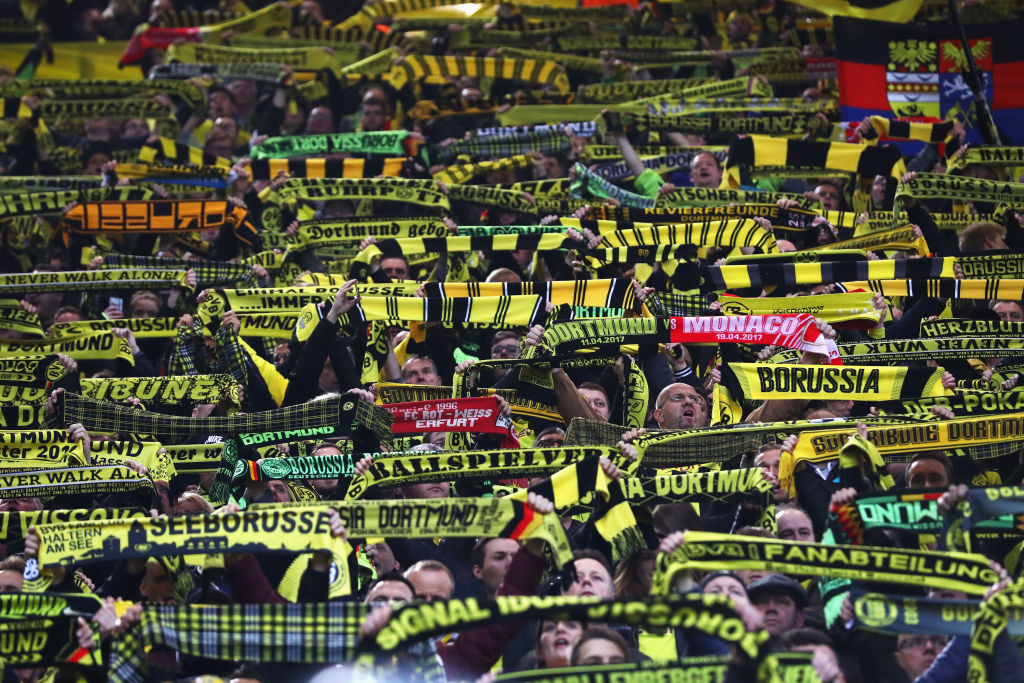Germany lost a football match but won a moral victory last night, when Borussia Dortmund were defeated 3-2 at home by Monaco, in the first leg of the quarter finals of the Champions League. To restage a major fixture just 24 hours after a terrorist attack was a remarkable achievement. To restage it when the Dortmund team bus had come under direct attack, landing one of its players in hospital, was nothing short of incredible. Dortmund fans gave bed and board to stranded Monaco supporters, Monaco fans sang Dortmund songs in the stadium, and both teams gave it their all (every Dortmund player was given the option not to play, but all played regardless). A thrilling game was the best response, and the result was incidental. This was European sport at its finest. Football kept calm and carried on.
Thankfully, the injured footballer, Spanish international Marc Bartra, should be fine – though it seems he’ll miss the rest of this season. However, a police motorcyclist (who was escorting the bus from the team’s hotel to the stadium) suffered hearing damage, and who knows how it affected the other players on board – who mercifully remained unharmed. If the driver, Christian Schulz, hadn’t kept control of the vehicle as three remotely detonated pipe bombs shattered its windows and showered the interior with broken glass and shrapnel, heaven knows what might have happened. It was a narrow escape. Sadly, it seems unlikely that this will be the last such incident. So how much do we know about this sinister event so far?
It’s still (very) early days, of course, but it seems the German police are dismissing far-right and anti-fascist claims of responsibility as (particularly repugnant) hoaxes, and are focusing on a letter found at the scene claiming the attack was carried out in the name of Islamic State. This letter declared that celebrities and sportsmen from ‘crusading’ countries such as Germany (and Britain too, presumably) are on an Isis death list, due to Western actions in Syria. One man from the ‘Islamic Spectrum’ has been detained and police are searching for another. One is German, apparently – the other is Iraqi.
Does it matter where the perpetrators came from? In practical terms, of course it does – it’s a vital part of the investigation. Politically, it ought not to (as Brits have discovered, there are plenty of Islamic extremists who were born and raised in ‘crusading’ nations) yet, however erroneously, such atrocities can’t help but push subjects like immigration up the news agenda. We should resist these false associations. If recent attacks have taught us anything, it’s that it’s impossible to generalise. Terrorists claiming to act for Islamic State have attacked a wide range of countries, with a wide range of immigration policies. These attackers have ranged from recent Muslim immigrants to UK citizens of half-a-century’s standing. Whatever glib conclusions we draw from this attack, it’s likely the next attack will refute them.
In the meantime, Borussia Dortmund will do what they do best, and focus on the next game. The second leg, in Monaco, is less than a week away, and to prepare for that return fixture like any other match will surely be the best therapy. Anyone who’s been to Dortmund will know this club occupies a unique place in German, and European football. A poor post-industrial city beset by unemployment and deprivation, it’s still somehow produced one of Europe’s best (and best supported) football teams, despite having to sell their best players – usually to Bayern Munich. Ironically, this admirable club draws many of its fans and players from Dortmund’s large and diverse immigrant community, for whom Borussia Dortmund is a source of local pride and kinship. It’s this immigrant story, rather than clumsy generalities, which we should focus on in the difficult times ahead.






Comments